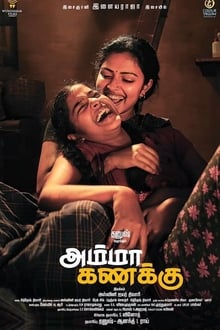
The Tamil version of the Hindi film Nil Battey Sannata, Amma Kanakku is a feel-good drama — the kind of film that leaves you with a warm, fuzzy feeling — despite dealing with an important subject: the need to have an ambition in life. It is a well-intentioned film that largely avoids the heavy-handed melodrama that such 'message movies' tend to go for, only succumbing to this pitfall towards the end.
The story revolves around Shanthi (Amala Paul), a single mother who works as a maid and does other odd jobs to make a living and raise her teenaged daughter Abinaya (Yuvalakshmi, adequate). But the girl has preconceived notions on life. She believes that just like a doctor's child growing up to become a doctor, she would grow up to become a maid. She isn't interested in academics because of this attitude of hers. Her worried mother, who wants a better future for her, decides to change her way of thinking by enrolling in the Abi's own class as a student. Does this ploy of Shanthi work?
What works in Amma Kanakku is how Ashwiny Iyer Tiwari treats incidents in a low-key manner even while never trivialising the conflict in this tale. In the very little time she takes to establish Shanthi's and Abi's characters, we get to know where the two stand. For all her short-sightedness and adamant attitude, we understand why Abi doesn't have a dream in her life. She is living in a world where becoming a driver or a peon in a government office are considered achievements. At the same time, we see Shanthi working for the kind-hearted Dr Nandini (Revathi, lending heft to a lightweight role with her 'veteran actress' stature), and she has seen the kind of life that good education and aspirations can lead to, and realise why she wants her daughter to dream big.
Ashwiny's narration is also fleet-footed in the first half, with an undercurrent of humour running throughout the scenes. And in Ranganathan (Samuthirakani), Abi's school principal, we clearly see the kind of tone that the director is going for. From the improbable situations (like Shanthi's visit to a collector's residence) to Samuthirakani's slapstick performance, there is a lot of whimsy in this tale. This is even more evident in Ilaiyaraaja's score which wouldn't have been out of place in a silent film.
But even here, there are times when you can sense the presence of a director, be it in the performances or in the production design, that robs the film of spontaneity. Even with Amala Paul, who emotes well and holds the film together, we keep wishing that she had dubbed for herself. Her voice has been provided by Uma, whose modulation here is so close to what she did for Ritika Singh in Irudhi Suttru that it is somewhat jarring as the latter film (and performance) is still fresh in our memory.
And some time into the second half, the tone begins to change and the film starts resembling the kind of film that one might picture in their minds when they hear of such a subject. Things start turning overtly emotional, and by the time we get to the climax, the dialogues start resembling fortune cookie quotes (eg: Un kanavu niravera un nambikkaidhaan kaaranam). It is only the panache in the filmmaking that stops the film from crumbling.